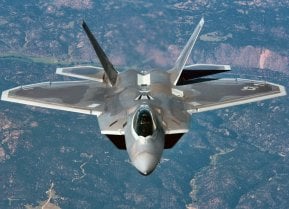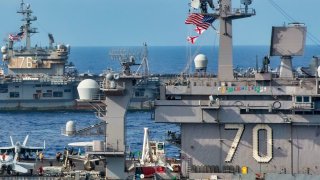China Could Be Getting Ready to Invade Taiwan Soon
China's recent military maneuvers around Taiwan, coinciding with the inauguration of Taiwan's new president, Lai Ching-te, signal Beijing's warning against Taiwan declaring independence. This aggressive display included 42 Chinese aircraft and 31 naval vessels encircling Taiwan, prompting Taipei to deploy supersonic anti-ship missiles and coast guard units in response.
Summary: China's recent military maneuvers around Taiwan, coinciding with the inauguration of Taiwan's new president, Lai Ching-te, signal Beijing's warning against Taiwan declaring independence. This aggressive display included 42 Chinese aircraft and 31 naval vessels encircling Taiwan, prompting Taipei to deploy supersonic anti-ship missiles and coast guard units in response. While both U.S. presidential candidates oppose Taiwanese independence, China’s actions highlight a potential crisis. Analysts suggest China could blockade Taiwan before attempting an invasion, betting on Western reluctance to intervene.
China’s Encirclement of Taiwan: A Prelude to Conflict?
If, as Clausewitz said, all politics is an extension of war, then the world should not be surprised by the recent news that Taiwan was surrounded by a relatively large flotilla of Chinese People’s Liberation Army Navy (PLAN) warships and Chinese Coast Guard cutters.
As if that wasn’t enough, as the Chinese naval forces were encircling the embattled democracy, Beijing ordered massive numbers of their ground and rocket forces to move to China’s coastline, in a clear signal that Beijing was willing—and able—to clip China’s dreams of independence in relatively short order.
Why did China choose now to perform this maneuver?
It’s All Politics, All the Time
Well, that gets us back to the whole political angle.
You see, the day that the Chinese decided to conduct their snap military drills around their democratic neighbor of Taiwan was the day that Taiwan’s new president, Lai Ching-te, was inaugurated. So, here we have the political message from Beijing: don’t even think about declaring independence from us, President Lai! The only real question is: will the message be heeded?
Toward that end, it should be noted that neither presidential candidate in 2024, current Democratic Party President Joe Biden or former Republican President Donald J. Trump, favor Taiwanese independence.
For its part, the United Nations (which has been thoroughly corrupted by Chinese funny money over the years), received much flack in the Western press for insisting that the UN position on the Sino-Taiwan conflict favors Beijing’s stance on Taiwan, that Taiwan is merely a province of the People’s Republic of China.
The UN spokesperson who made this claim referred to the 1971 UN resolution which officially embraced the “One China” formulation.
Of course, the “One China” formulation from the 1970s is more complicated than the title suggests. After all, it was once known as the “One China, Two Systems” agreement. And beyond the 1971 resolution, this view was cemented by both Washington and Beijing in the 1979 Shanghai Communique.
So, while it’s true that China and the United States agreed that Taiwan would no longer be accepted in the international community as an independent country, the fact of the matter was, there was never any acquiescence to Taiwan becoming a province of China.
Anyway, clearly neither the Chinese nor the rest of the international community are totally wedded to that view. And China is obviously willing to risk a war to ensure that Taiwan is treated as nothing more than a province.
Thus, the making of an international crisis is at hand.
On the day of President Lai’s inauguration, 42 aircraft belonging to the People’s Liberation Army Air Force (PLAAF) appeared over the skies of Taiwanese territory, with 28 of those birds crossing the median line (the supposed demarcation between Chinese and Taiwanese territory). Beyond that, 15 PLAN warships floated into Taiwanese waters, with an additional 16 Chinese Coast Guard cutters slicing their way into Taiwanese territorial waters.
A Looming Disaster
In response to the clear provocation from Beijing, Taipei deployed units of their Hsiung Feng III (HF-3) supersonic anti-ship ballistic missiles to their coastline. Plus, they launched their own coast guard units to chase away the Chinese forces, which had completely encircled the island. In one instance, there was a tense standoff between Taiwanese Coast Guard ships and Chinese warships.
Meanwhile, rumors percolated on social media that China was contemplating an invasion of Taiwan this June (for the record, that’s about a week away from the time of this writing). Given the way things have gone in Taiwan’s politics, it would be imprudent for them to assume that China is merely posturing. Considering how swiftly China moved its forces into blocking Taiwan, Taipei needs to be prepared for the possibility that China will move to at least blockade the island this summer.
Whenever China decides to move against Taiwan, Taiwan’s military—and people—must be ready to resist for a protracted period of time. Sadly, Taiwan is not well prepared. While elements of the US Air Force and Marines believe that China is planning to conduct a lightning-style air war upon Taiwan, there are strategists in the US Navy who believe that China is planning a slower campaign that first involves a long-term blockade of the island to bleed the isolated democracy.
A Blockade or Lightning War for Taiwan?
From there, China may try to invade the island only after Taiwan has been strangled economically.
This prospect, by the way, is what multiple sources within Taiwan’s Foreign Ministry are fearful of. It would also comport with China’s commitment to hybrid warfare concepts. By slowly ensnaring Taiwan in a long-term blockade, Beijing would be daring a weakened, distracted, and poorly led West to challenge them in a meaningful way. It is unlikely that the Western powers, outside of possibly Japan, would seriously offer resistance.
Over time, if this is how the Chinese implement their plan, China’s strategists believe that Taiwan will be unable to withstand the strangling of their island and will be toppled easily after a protracted blockade. Whether true or not, the fact remains China believes they can take Taiwan.
And that’s when grievous great power conflicts erupt.
About the Author
Brandon J. Weichert, a National Interest national security analyst, is a former Congressional staffer and geopolitical analyst who is a contributor at The Washington Times, the Asia Times, and The-Pipeline. He is the author of Winning Space: How America Remains a Superpower, Biohacked: China’s Race to Control Life, and The Shadow War: Iran’s Quest for Supremacy. His next book, A Disaster of Our Own Making: How the West Lost Ukraine, is due October 22 from Encounter Books. Weichert can be followed via Twitter @WeTheBrandon.
Image Credit: Creative Commons.


